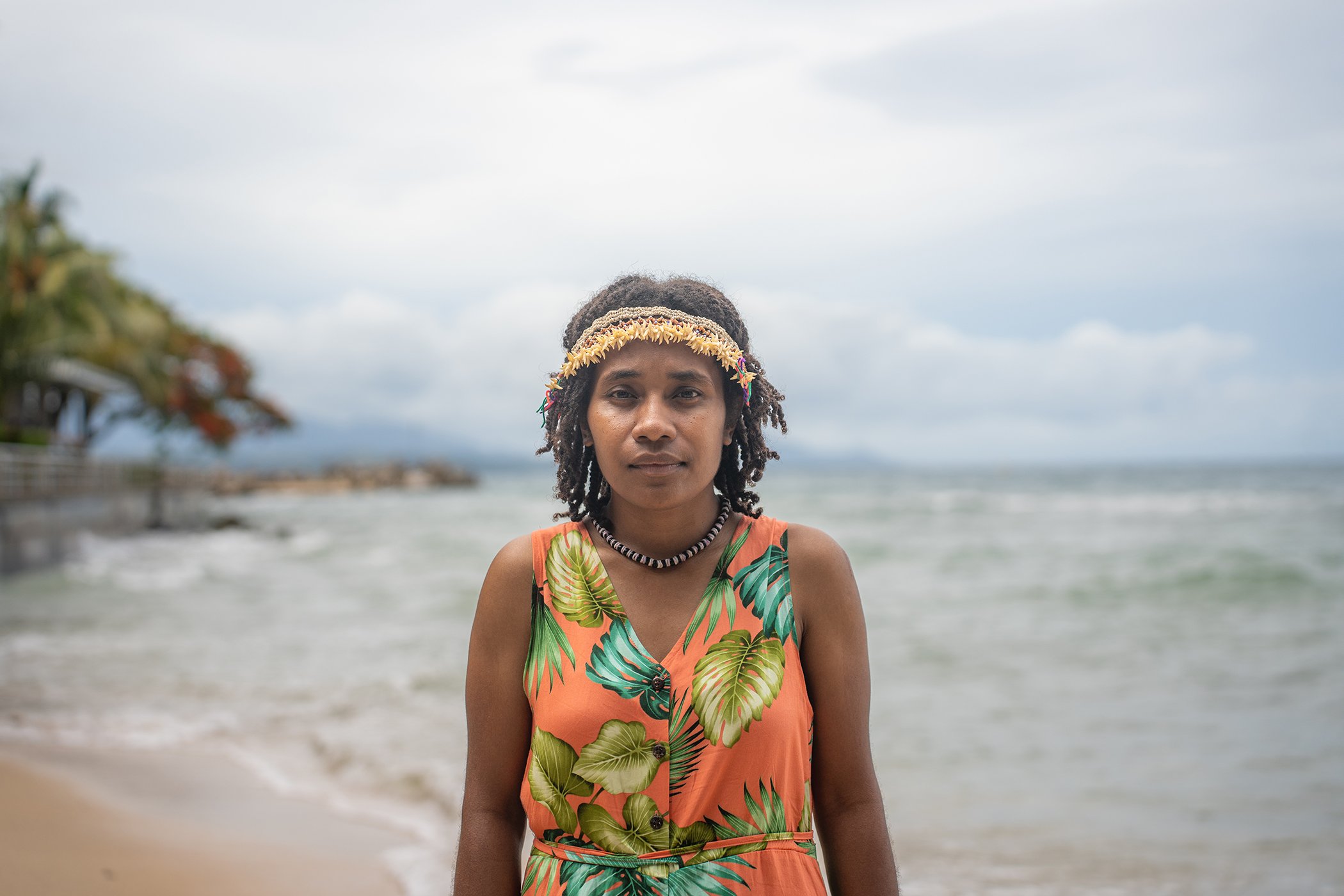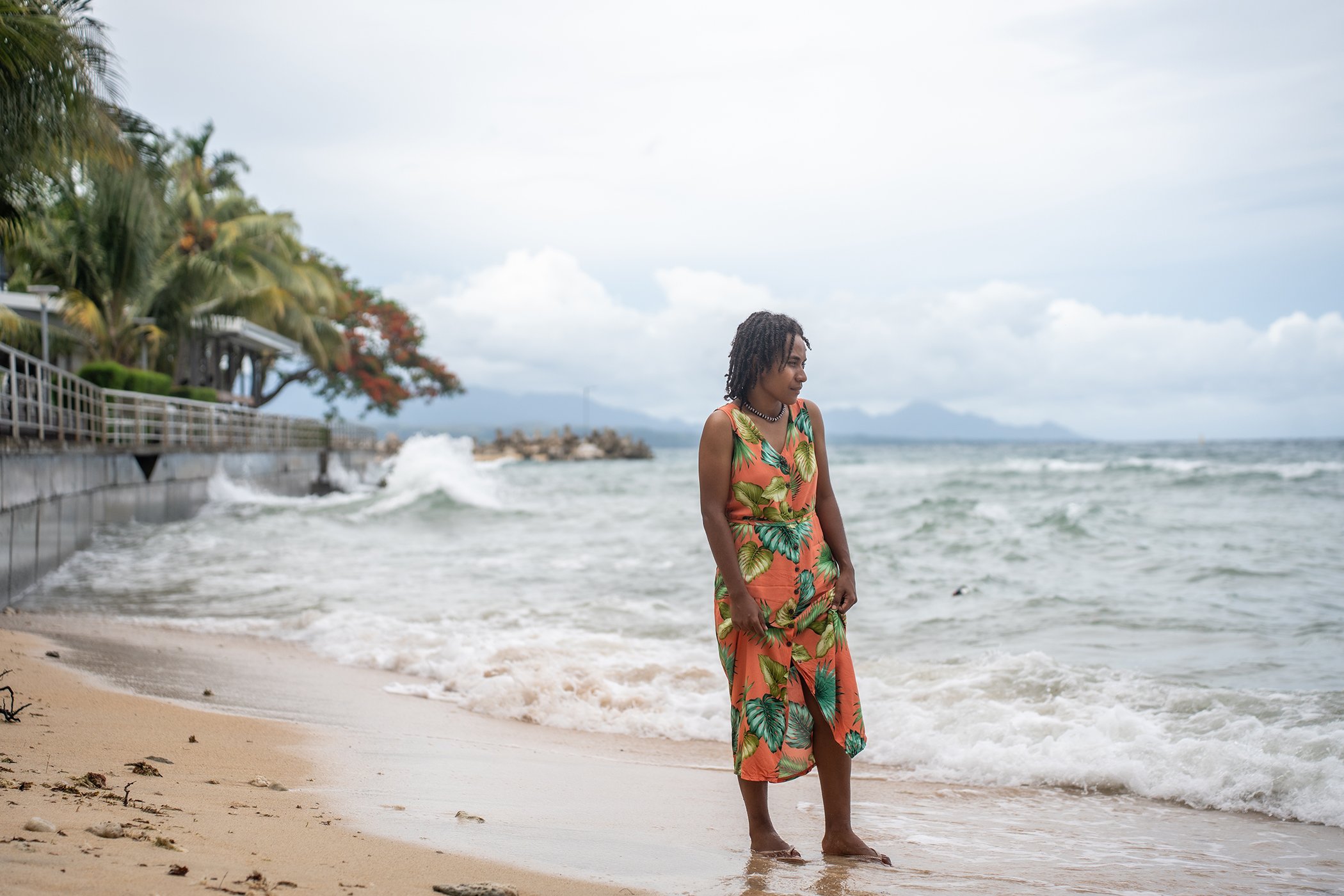The Solomon Islands ranks as one of the most at-risk nations for natural disasters in the world and a large percentage of the population lives less than a kilometer from the sea that, with rising sea levels, threatens to engulf the nation and impact its people.
Civic space is also considered narrowed in the Solomon Islands, as there are ongoing concerns about press freedom and media independence in the Pacific Island nation. Cynthia Houniuhi is the president of Pacific Islands Students Fighting Climate Change (PISFCC) and a Young Activist Summit Laureate for 2024, in her words and through her experiences as a citizen of the Islands and as a law student she shares why it’s critical that she as a young person is at the forefront of defending the planet.
My name is Cynthia Houniuhi.
Some may refer to me as a climate activist, but I am just a young woman trying to do what I can to contribute to helping my people and my country.
I don’t want to be celebrated for it because I am working towards a cause that will benefit not only my people but the generations to come — that is the reward. I had a great childhood growing up, I was often outdoors in the ocean or the forest, either fishing for lunch (or dinner) or gathering edible plants with the grandmas and aunties. There was a lot of intergenerational learning in my childhood, about where I come from and our connection to the land and ocean from my parents, grandparents, and other family members.
My journey officially began in 2019 — my third year of law school.
Our professor challenged us (myself and 26 other students) to use the law as a vehicle for the acceleration of climate action to reflect the realities of the adverse effects of the climate impacts on our homes and our people.
This resonated with me as I grew up on one of the remote islands in the Solomon Islands. Growing up on the most remote island meant that you lived off the land, and access to convenient shops and other modern luxuries of life was not something you saw. So, from an early age, I learned the value of land and the value it adds to you. We also learned how to care for and respect the land because we came from the land, and there is a spiritual connection with our land and oceans.
One memory I recall as a start of my climate justice journey was when I saw firsthand the impacts of sea level rise on one of the Islands I come from called Fanalei. We have family members and relatives on this island, and I remember traveling there from the Capital, where I attended school. I saw how the salt water has crept into the village to the point of having some houses standing in the water.
I asked my family members if it had always been this way, and they told me that it was not like this before. This made me question what was happening, so I started on this journey to help defend and protect the land. The more I learned — not only from books but also from talking to uncles and aunties — the more it became clear that my journey was about climate justice.
 Cynthia Houniuhi poses for a portrait in Honiara, Soloman Islands in December 2024.
Cynthia Houniuhi poses for a portrait in Honiara, Soloman Islands in December 2024.
I learned that salt water in our homes was not because of my people’s doing.
We contribute almost nothing to this, but we are the ones losing our homes to sea level rise. We are the ones whose future generation will lose their cultural heritage. It is unfair. The more I learn, the more it frustrates me that it is not only my people facing this crisis, but there are others around the world who also contribute almost nothing to this. I wanted climate justice.
I did not fully understand the power or the avenues I could explore to bring about the change our people desperately needed until I began law school. I wanted to do law because I knew it could help give me the knowledge I needed to come up with solutions for my people. I began law school at the University of the South Pacific in 2017. I learned about the different existing climate change regimes in my third year.
The more we learned about the climate change regimes...
...the more we realized that progress is moving at no more than a glacial pace.
Meanwhile, communities like mine at the frontline of the climate crisis need urgent climate action to reflect the everyday lived realities of the crisis. It inspired us to look for ways to accelerate climate action, not just any climate action but ambitious climate action.
Our professor challenged us to find a legal pathway and take it to our Pacific Islands Leaders.
From our research, the legal pathway that resonated with us was to seek an advisory opinion from the International Court of Justice. We were inspired by a similar unsuccessful attempt by the island nation of Palau; it was the most ambitious legal pathway on our list, and we were convinced that the potential benefits of an advisory opinion from the International Court of Justice could start the process of ambitious climate action.
We wanted a forward-looking solution, so we also advocated for greater protection of the rights of future generations, who have the most to lose due to the nature of the climate crisis. In the classroom in Port Vila, Vanuatu, we decided to create a group to action this initiative we came up with.
The group is now globally recognized as Pacific Islands Students Fighting Climate Change, with four sub-offices in Fiji, Solomon Islands, Tonga, and Vanuatu. Our main focus is to seek an advisory opinion from the International Court on Justice on Human Rights and Climate Change.
Our group is using the law as an avenue for climate action.
We also focus on educating and activating youth activism in the Pacific Islands. We saw that accountability is needed regarding the existing obligations to address the greatest challenge of our time. We truly believe in the rule of law and that we are all equal under the law. And the nature of the climate crisis is that those that bear the brunt of it are the ones least responsible. We need to uphold justice when there is climate injustice.
As young people, we have a right to access justice and remedy when there is a breach of our rights; hence, we must journey to uphold these rights and seek greater protection for the rights of future generations.
The journey from our classroom to the International Court of Justice (ICJ) has always been inclusive, as the process requires consensus to get a simple majority from the United Nations General Assembly to vote to request an advisory opinion from the ICJ.
 Cynthia Houniuhi is photographed in Honiara, Soloman Islands. The Solomon Islands ranks as one of the most at-risk nations for natural disasters in the world and a large percentage of the population lives less than a kilometer from the sea.
Cynthia Houniuhi is photographed in Honiara, Soloman Islands. The Solomon Islands ranks as one of the most at-risk nations for natural disasters in the world and a large percentage of the population lives less than a kilometer from the sea.
We made representations in December 2024, at the end of which the ICJ judges asked a few questions to the participating states and gave them a few weeks to reply. Currently, we are waiting for the delivery of the advisory opinion at a date to be confirmed. Once the ICJ advisory opinion is delivered, it will be the sacred document we can use to guide us into the next campaign phase. It is the advisory that we have campaigned for for five years. Our next focus would be on the contents of the advisory opinion. We hope for a progressive opinion. Our people desperately need that. The world needs it.
The whole process of seeking an advisory opinion started from a grassroots level, led to youths and CSOs from around the world, and finally ended with influencing over 130 United Nations member countries. This shows that most of the world recognized the greatest challenge of our century and the value that the UN’s principal judicial organ, the International Court of Justice, can add to the existing mechanisms to address climate change.
The model we use is working closely with our governments and not against it.
There have been efforts by those who have gone before us to create a space where we can dialogue with our government representations. So it has worked in our favor as our governments want the same thing we do. They have also included us in the country’s delegation to the UNFCC Conference of the Parties and have ensured that young people like us were represented. Based on that model, we have fortunately been able to freely advocate and speak to our government representation about these issues.
I have never experienced violence or backlash from authorities in the country. The only backlash I fear is the fear of misrepresenting the cultural diversity and different climate stories in the Solomon Islands. I put extra pressure on myself to make sure I bring awareness to the realities we face and do it justice because we are not often given a seat at tables that we should be sitting at when we come to the international stage.
We have benefited from awards such as the Young Activists Summit in getting visibility…
…as our aim is to bring more attention to the biggest climate case in our history so far. I believe continued support from governments, civil society organizations, and fellow activists from around the world can continue to help us have an impact. And, importantly, genuine support from those who believe in our cause and want a better future for everyone.
This article, as narrated to Gugulethu Mhlungu, has been slightly edited for clarity.
If you want to contact and explore supporting Cynthia and the Pacific Islands Students Fighting Climate Change, visit their website by clicking here.
The 2024-2025 In My Own Words Series was made possible thanks to funding from the Ford Foundation.